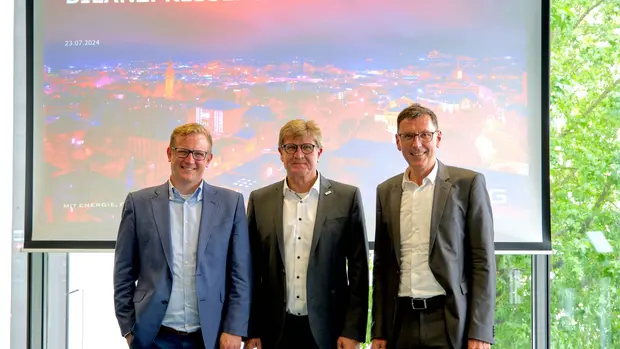
At a press conference, Alexander Wright, Chairman of the SWG Supervisory Board, and the two SWG Management Board members presented Stadtwerke Gießen's thoroughly pleasing balance sheet.
Stadtwerke Gießen (SWG) successfully concluded its fourth year of crisis in 2023. The current company balance sheet published on 23 July 2024 shows a profit of around 16.8 million euros - around 8.4 million euros more than in 2022. However, this exceptionally good result needs to be put into perspective. This is because the profit from operating activities is around 5.5 million and therefore almost exactly the same as in 2022. "The large increase in the annual result is the result of a special effect," explains Jens Schmidt, Commercial Director of SWG. The company was able to terminate a long-term purchase agreement and release the provisions that had been accrued over many years in the ongoing dispute.
Thanks to its successful work, SWG is in a position to distribute a dividend of 2.8 million euros to its owner, the city of Giessen. The remaining 14 million euros are set aside by SWG as reserves - which raises the equity ratio to 38.8 per cent. Chairman of the Supervisory Board Alexander Wright's summary is correspondingly positive: "I'm not worried about the future of Stadtwerke. The company has a rock-solid financial foundation and is ideally prepared for the complex tasks ahead."
The outgoing Commercial Director Jens Schmidt sees the consistent strategy of recent years confirmed and emphasises the assessment of the Chairman of the Supervisory Board: "SWG is in a good economic position and is well prepared for the challenges ahead." He is referring specifically to the transformation of all German energy suppliers necessitated by the energy transition. In future, they will primarily have to deal with the expansion of electricity and heating grids, the conversion of generation plants and increased digitalisation. SWG is working on this transformation individually with each of the 16 municipalities it supplies. After all, regional solutions are SWG's strength.
Challenges mastered
Matthias Funk, Chief Technical Officer, explains the key reason for the considerable surplus from SWG's actual business activities: "The hard work of our dedicated team has once again laid the foundation for our success. I would like to take this opportunity to expressly thank all our employees on behalf of my colleagues. You can always rely on their tireless commitment and their extensive, in-depth expertise." As an example, the Management Board members mentioned the additional effort that SWG had to make due to the measures introduced by politicians to reduce energy prices. In the middle of the year, VAT was raised back to the regular rate and the energy price brakes expired. The latter in particular meant a great deal of effort.
"Our employees did all of this in addition to their day-to-day business and are still doing it today, as we are not yet back to normal operations everywhere. At the same time, we are also concentrating our efforts on the tasks ahead," summarises Matthias Funk.
Relaxation on the energy exchange
The most important development for the entire energy sector and for all energy customers in 2023 was the calming of the energy markets. This was reflected in significantly lower prices on the energy exchange. "As usual, we passed on our better conditions to our customers," recalls Jens Schmidt. In fact, SWG was already able to significantly reduce its electricity prices in January and its gas prices in July 2023.
Not only economically successful
The fact that 2023 was a good year for SWG can be seen in more than just the figures. The company pushed ahead with immensely important projects and brought some of them to a successful conclusion. "We are particularly pleased that the city of Giessen has once again awarded us the concessions for the gas and electricity grids," explains Jens Schmidt. Other municipalities in the region also appreciate SWG's expertise. The town of Linden recently extended its existing concession agreements for gas and electricity with SWG.
Another example of how closely and effectively the city of Giessen and SWG work together can be seen elsewhere: in 2023, the two partners founded MIT.GIESSEN GmbH. The mission of the joint subsidiary is to install photovoltaic systems on municipal properties. Seven systems with a combined output of 360 kilowatts peak are already supplying renewable electricity. The plan is to continue at this pace. The plan is to build solar power plants with a total output of around 719 kilowatts peak between 2024 and 2028.
Even more photovoltaics
Independently of this, SWG has been able to advance other important photovoltaic projects - such as the topic of tenant electricity. The energy experts from Lahnstrasse are thus enabling more and more people to participate in the energy transition. In the Philosophenhöhe development area, SWG tenant electricity is an integral part of the concept: "Practically all available roof areas here are equipped with photovoltaic modules from the outset," says Matthias Funk, describing the situation.
With the founding of MIT.GIESSEN and the introduction of tenant electricity, SWG is continuing what it started in the private customer segment with the e-revolution: the consistent expansion of photovoltaics (PV) in Giessen and the region. At the same time, SWG has of course also been offering commercial enterprises the opportunity to obtain a PV system tailored to their individual needs easily and at a favourable price for some time now.
Lighthouse project for the heat transition
Increasingly generating electricity from renewable sources is an important component of the energy transition. The decarbonisation of heat generation is at least as important. SWG also achieved a great deal in this sector in the past financial year. A particular focus is on PowerLahn, a project in which SWG is combining three large heat pumps, a combined heat and power plant (CHP) and a direct electric heating system to create an innovative combined heat and power plant. The grant was awarded to Lahnstrasse in mid-2022. Since then, the specialists in charge have been working flat out on this pioneering project. SWG will start building the energy centre in Schlachthofstrasse this year. From here, heat extracted from the river water will be fed into the district heating network. Construction work will also start in 2024 at the second site, the combined heat and power plant in Leihgesterner Weg, where SWG will have the CHP plant, which can of course also be operated with hydrogen, and the direct electric heating system installed.
Getting science on board
One of the tasks of the Institute for Transformation Tasks in the Energy Industry and Energy Technology (ITEE) is to identify the most suitable and economically viable options for decarbonising heat generation in the region. SWG and 14 other regional energy suppliers founded the association on the initiative of the Technische Hochschule Mittelhessen (THM). In order to ensure an optimal connection to the university, the ITEE is being transformed into a so-called affiliated institute. This has several advantages: The research institution remains legally independent, but there is a close organisational and personnel connection with the THM. This offers employees of the participating companies the opportunity to study at THM alongside their jobs. Conversely, this constellation gives students an insight into the energy industry, which adds a practical component to their education. Last but not least, the work of the association offers its members the opportunity to recruit specialists who have already familiarised themselves with the complex subject matter.
Everything absolutely watertight
In 2023, SWG completed the renovation of old grey cast iron gas pipes. The long-term project, which began in 1997, was triggered by an instruction from the energy regulator. There was good reason for this: grey cast iron is potentially brittle and therefore leaks. "But our predecessors didn't know that when they decided in favour of this material," admits Matthias Funk. Shortly before the planned end date of 31 December 2023, SWG was able to announce completion.
Seal of approval for drinking water
As in the electricity and gas divisions, SWG voluntarily obtained certification for drinking water in accordance with the strict Technical Safety Management (TSM) requirements in 2023. They accepted the associated effort for good reason. "SWG wants to help the many municipalities in the region to fulfil the constantly increasing demands placed on operators of drinking water networks and offer operational management as a service," says Jens Schmidt, explaining the strategy. And it is precisely for this purpose that proof of fulfilling the highest standards in terms of safety and quality is extremely helpful.
Training together
In the area of swimming pools, SWG has launched a special training initiative together with the municipalities in the district of Giessen: All towns and municipalities in the district that maintain swimming pools but have limited or no training opportunities for pool attendants can draw on the experience and expertise of SWG. The first local authorities are already taking advantage of this opportunity.
Diversity as an opportunity
It is well known that the shortage of skilled labour is not limited to the pool sector. Companies from practically all sectors are looking for well-trained employees. One of the ways in which SWG is tackling this key problem is by recognising diversity as an opportunity more than ever and anchoring it within the company. In the past financial year, they took an important step in this direction that was also visible from the outside - by signing the Diversity Charter.
Outlook for 2024
As usual, the two SWG Management Board members used the press conference to take a look at current projects at SWG. In fact, many things have already developed positively in the first half of 2024. For example, the transformation plan for the district heating network in Giessen has been finalised. "We can already say relatively precisely how we will generate climate-neutral district heating in future," says Matthias Funk happily. SWG's heat transformation plan is a central pillar of the municipal heating plan that the city of Giessen has to submit by June 2028. "We very much appreciate the fact that SWG has already built up such a large district heating network and can already demonstrate how it will decarbonise its heat generation in the coming years. Giessen is much further ahead than most German cities in this respect," adds Alexander Wright.
A new electricity tariff offer underlines SWG's efforts to take Giessen and the region further in terms of the energy transition. This is because Natur-Power Aktiv is the first electricity from SWG to be certified with the Green Electricity Label (GSL) - the gold standard among quality labels. The label is impressive in several ways: no other label has stricter award criteria and the GSL is backed by renowned civil society organisations.

